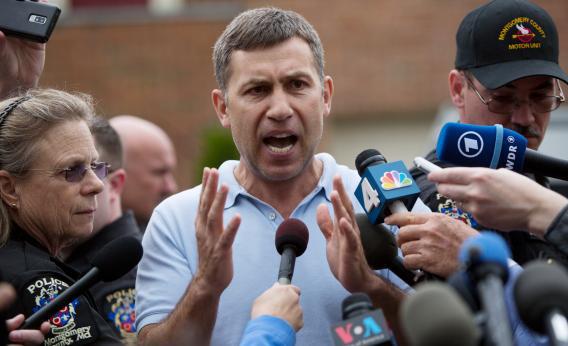From the moment we heard of an explosion at the Boston Marathon, the talk on television, Twitter, and in everyday conversations has been about which category the killers belonged to. Muslims? White supremacists? Arabs? Dark-skinned? Even in the hours since we learned the suspects’ names, it’s been all about nationality and ethnicity: Chechnya, Dagestan, Kyrgyzstan, Russia.
Then, shortly after 11:30 this morning, Ruslan Tsarni, an uncle of the two suspects, stepped out of his house in Maryland and delivered an extraordinary message about character, shame, and collective responsibility. If you haven’t seen the video, watch it below. And keep the memory of it with you in the days to come.
Tsarni said he was coming out to express condolences to the families of the victims in Boston. He spoke with anguish and specificity about each of the dead. He had nothing to do with the bombings, yet he felt an awful connection to them. He couldn’t imagine, he said, that “the children of my brother would be associated with them.”
Association is a hard thing. The suspects are Tsarni’s nephews. He’s related to them, but he’s also separate from them. “We have not been in touch with that family for a number of years,” he said.
A reporter asked Tsarni whether he knew of any ill will his nephews had felt toward the United States. He said he hadn’t. “If I had guessed,” he added, “I would just submit them myself.”
A reporter asked what might have provoked the violence. “Being losers,” Tsarni shot back. “Hatred to those who were able to settle themselves” in this country. Then Tsarni raised his voice to make a point: “Anything else to do with religion, with Islam—it’s a fraud. It’s a fake.” He went on: “We are Muslims. We are Chechens.” But that didn’t explain his nephews’ violence, he said. “Somebody radicalized them.”
Tsarni tried to explain that his birth family had drifted apart. Speaking of his brother, the father of the two suspects, Tsarni said, “My family has nothing to do with that family.” In fact, he continued, “This family [has] had nothing to do with them for a long, long time.” When a reporter asked why, he refused to say more than, “I just wanted my family [to] be away from them.”
The press wouldn’t let go. “Are you ashamed by what has unfolded?” a reporter asked. “Of course we are ashamed!” Tsarni exclaimed. “They are [the] children of my brother.” But even his brother, he cautioned, “has little influence” on the two young men.
A reporter asked Tsarni how he felt about the United States. Tsarni, his voice rising, declared it the “ideal” country, a microcosm of the “entire world.” He went on: “I respect this country. I love this country—this country which gives a chance to everybody else to be treated as a human being.”
A reporter asked whether the young men had ever been caught up in the fighting in Chechnya. Tsarni spat back, “No! They’ve never been in Chechnya. This has nothing to do with Chechnya. Chechens are different. Chechens are peaceful people.” The young men weren’t even born there, he said. One was born in Dagestan, the other in Kyrgyzstan.
Muslims, Chechens, immigrants, the family, even the parents—it wasn’t fair to hold any of these people responsible. And yet Tsarni couldn’t escape the feeling of collective disgrace. “He put a shame on our family,” he told the reporters. “He put a shame on the entire Chechen ethnicity.”
In the end, Tsarni raised his hands and asked to say one more thing: “Those who suffered, we’re sharing with them, with their grief—and ready just to meet with them, and ready just to bend in front of them, to kneel in front of them, seeking their forgiveness. … In the name of the family, that’s what I say.”
All of us will remember images from this horror. The innocent boy standing on the rail in his final moments. The unassuming killer apparently dropping the backpack nearby. The explosions. The blood-spattered ground. The surveillance video. The manhunt. We’ll gossip and argue about countries, religions, and cultures. But don’t forget the uncle. Don’t forget his plea—even as he begged for forgiveness for his family, even as he lamented the stain on his nationality and his faith—that no religion, no country, and no people can be blamed for such an atrocity. Any of us could be this man, the innocent man who could not shake his shame.
Read more on Slate about the Boston Marathon bombing.
William Saletan’s latest short takes on the news, via Twitter:
